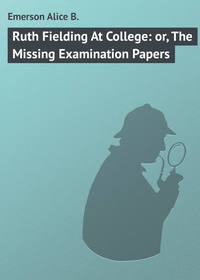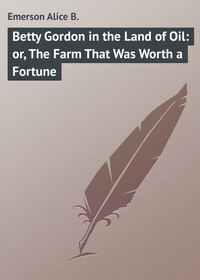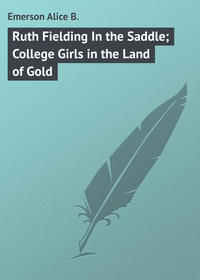 полная версия
полная версияRuth Fielding at Lighthouse Point: or, Nita, the Girl Castaway
“Your idea of fun, young man, is very much warped,” Madge Steele added.
“Haven’t they got the wrecked people off?” demanded Tom, in wonder.
At the moment an added Coston burned up on the wreck. Its uncertain glare revealed the shrouds and torn lower rigging. They saw several figures–outlined in the glaring light–lashed to the stays and broken spars. The craft was a schooner, lumber-laden, and the sea had now cast her so far over on her beam-ends that her deck was like a wall confronting the shore. Against this background the crew were visible, clinging desperately to hand-holds, or lashed to the rigging.
And a great cry went suddenly up from the crowd ashore. “There’s women aboard her–poor lost souls!” quavered one old dame who had seen many a terrifying wreck along the coast.
Ruth Fielding’s sharper eyes had discovered that one of the figures clinging to the wreck was too small for a grown person.
“It’s a child!” she murmured. “It’s a girl. Oh, Helen! there’s a girl–no older than we–on that wreck!”
The words of the men standing about them proved Ruth’s statement to be true. Others had descried the girl’s figure in that perilous situation. There was a woman, too, and seven men. Seven men were ample to man a schooner of her size, and probably the other two were the captain’s wife and daughter.
But if escape to the shore depended upon the work of the lifeboat and her crew, the castaways were in peril indeed, for the boat was coming shoreward now with a rush. With her came the tossing, charging timbers washed from the deck load. The sea between the reef and the beach was now a seething mass of broken and splintering planks and beams. No craft could live in such a seaway.
But Ruth and her friends were suddenly conscious of a peril nearer at hand. The broken lifeboat with its crew was being swept shoreward upon a great wave, and with the speed of an express train. The great, curling, foam-streaked breaker seemed to hurl the heavy boat through the air.
“They’ll be killed! Oh, they will!” shrieked Mary Cox.
The long craft, half-smothered in foam, and accompanied by the plunging timbers from the wreck, darted shoreward with increasing velocity. One moment it was high above their heads, with the curling wave ready to break, and the sea sucking away beneath its keel–bared for half its length.
Crash! Down the boat was dashed, with a blow that (so it seemed to the unaccustomed spectators) must tear it asunder.
The crew were dashed from their places by the shock. The waiting longshoremen ran to seize the broken boat and drag it above high-water mark. One of the crew was sucked back with the undertow and disappeared for a full minute. But he came in, high on the next wave, and they caught and saved him.
To the amazement of Ruth Fielding and her young companions, none of the seven men who had manned the boat seemed much the worse for their experience. They breathed heavily and their faces were grim. She could almost have sworn that the youngest of the crew–he had the figure “6” worked on the sleeve of his coat–had tears of disappointment in his eyes.
“It’s a desperate shame, lads!” croaked old Cap’n Abinadab. “We’re bested. And the old boat’s badly smashed. But there’s one thing sure–no other boat, nor no other crew, couldn’t do what we started to do. Ain’t no kick comin’ on that score.”
“And can’t the poor creatures out there be helped? Must they drown?” whispered Helen in Ruth’s ear.
Ruth did not believe that these men would give up so easily. They were rough seamen; but the helplessness of the castaways appealed to them.
“Come on, boys!” commanded the captain of the life saving crew. “Let’s git out the wagon. I don’t suppose there’s any use, unless there comes a lull in this etarnal gale. But we’ll try what gunpowder will do.”
“What are they going to attempt now?” Madge Steele asked.
“The beach wagon,” said somebody. “They’ve gone for the gear.”
This was no explanation to the girls until Tom Cameron came running back from the house and announced that the crew were going to try to reach the schooner with a line.
“They’ll try to save them with the breeches buoy,” he said. “They’ve got a life-car here; but they never use that thing nowadays if they can help. Too many castaways have been near smothered in it, they say. If they can get a line over the wreck they’ll haul the crew in, one at a time.”
“And that girl!” cried Ruth. “I hope they will send her ashore first. How frightened she must be.”
There was no more rain falling now, although the spray whipped from the crests of the waves was flung across the beach and wet the sightseers. But with the lightening of the clouds a pale glow seemed to spread itself upon the tumultuous sea.
The wreck could be seen almost as vividly as when the signal lights were burned. The torn clouds were driven across the heavens as rapidly as the huge waves raced shoreward. And behind both cloud and wave was the seething gale. There seemed no prospect of the wind’s falling.
Ruth turned to see the crew which had failed to get the lifeboat to the wreck, trundling a heavy, odd-looking, two-wheeled wagon down upon the beach. They worked as though their fight with the sea had been but the first round of the battle. Their calmness and skillful handling of the breeches buoy gear inspired the onlookers with renewed hope.
“Oh, Cap’n Abinadab and the boys will get ’em this time,” declared Heavy. “You just watch.”
And Ruth Fielding and the others were not likely to miss any motion of the crew of the life saving station. The latter laid out the gear with quick, sure action. The cannon was placed in position and loaded. The iron bar to which the line was attached was slipped into the muzzle of the gun. The men stood back and the captain pulled the lanyard.
Bang!
The sharp bark of the line-gun echoed distressingly in their ears. It jumped back a pace, for the captain had charged it to the full limit allowed by the regulations. A heavier charge might burst the gun.
The line-iron hurtled out over the sea in a long, graceful curve, the line whizzing after it. The line unwound so rapidly from the frame on which it was coiled that Ruth’s gaze could not follow it.
The sea was light enough for them to follow the course of the iron, however, and a groan broke from the lips of the onlookers when they saw that the missile fell far short of the wreck. To shoot the line into the very teeth of this gale, as Cap’n Abinadab had said, was futile. Yet he would not give up the attempt. This was the only way that was now left for them to aid the unfortunate crew of the lumber schooner. If they could not get the breeches buoy to her the sea would be the grave of the castaways.
For already the waves, smashing down upon the grounded wreck, were tearing it apart. She would soon break in two, and then the remaining rigging and spars would go by the board and with them the crew and passengers.
Yet Captain Abinadab Cope refused to give over his attempts to reach the wreck.
“Haul in!” he commanded gruffly, when the line fell short. Ruth marveled at the skill of the man who rewound the wet line on the pegs of the frame that held it. In less than five minutes the life-savers were ready for another shot.
“You take it when the regular crew are at practice, sometimes,” whispered Heavy, to Ruth, “and they work like lightning. They’ll shoot the line and get a man ashore in the breeches buoy in less than two minutes. But this is hard work for these volunteers–and it means so much!”
Ruth felt as though a hand clutched at her heart. The unshed tears stung her eyes. If they should fail–if all this effort should go for naught! Suppose that unknown girl out there on the wreck should be washed ashore in the morning, pallid and dead.
The thought almost overwhelmed the girl from the Red Mill. As the gun barked a second time and the shot and line hurtled seaward, Ruth Fielding’s pale lips uttered a whispered prayer.
CHAPTER X
THE DOUBLE CHARGE
But again the line fell short.
“They’ll never be able to make it,” Tom Cameron said to the shivering girls.
“Oh, I really wish we hadn’t come down here,” murmured his sister.
“Oh, pshaw, Nell! don’t be a baby,” he growled.
But he was either winking back the tears himself, or the salt spray had gotten into his eyes. How could anybody stand there on the beach and feel unmoved when nine human beings, in view now and then when the billows fell, were within an ace of awful death?
Again and again the gun was shotted and the captain pulled the lanyard. He tried to catch the moment when there was a lull in the gale; but each time the shot fell short. It seemed to be merely a waste of human effort and gunpowder.
“I’ve ’phoned to the Minot Cove station,” the captain said, during one of the intervals while they were hauling in the line. “They’ve got a power boat there, and if they can put to sea with her they might get around to the other side of the reef and take ’em off.”
“She’ll go to pieces before a boat can come from Minot Cove,” declared one grizzled fisherman.
“I fear so, Henry,” replied the captain. “But we got to do what we can. They ain’t give me no leeway with this gun. Orders is never to give her a bigger charge than what she’s gettin’ now. But, I swan–”
He did not finish his sentence, but gravely measured out the next charge of powder. When he had loaded the gun he waved everybody back.
“Git clean away, you lads. All of ye, now! She’ll probably blow up, but there ain’t no use in more’n one of us blowin’ up with her.”
“What you done, Cap’n?” demanded one of his crew.
“Never you mind, lad. Step back, I tell ye. She’s slewed right now, I reckon.”
“What have you got in her?” demanded the man again.
“I’m goin’ to reach them folk if I can,” returned Cap’n Abinadab. “I’ve double charged her. If she don’t carry the line this time, she never will. And she may carry it over the wreck, even if she blows up. Look out!”
“Don’t ye do it!” cried the man, Mason, starting forward. “If you pull that lanyard ye’ll be blowed sky-high.”
“Well, who should pull it if I don’t?” demanded the old captain of the station, grimly. “Guess old ’Binadab Cope ain’t goin’ to step back for you young fellers yet a while. Come! git, I tell ye! Far back–afar back.”
“Oh! he’ll be killed!” murmured Ruth.
“You come back here, Ruth Fielding!” commanded Tom, clutching her arm. “If that gun blows up we want to be a good bit away.”
The whole party ran back. They saw the last of the crew leave the old captain. He stood firmly, at one side of the gun, his legs placed wide apart; they saw him pull the lanyard. Fire spat from the muzzle of the gun and with a shriek the shot-line was carried seaward, toward the wreck.
The old gun, double charged, turned a somersault and buried its muzzle in the sand. The captain dodged, and went down–perhaps thrown by the force of the explosion. But the gun did not burst.
However, he was upon his feet again in a moment, and all the crowd were shouting their congratulations. The flying line had carried squarely over the middle of the wreck.
“Now, will they know what to do with it?” gasped Ruth.
“Wait! see that man–that man in the middle? The line passed over his shoulder!” cried Heavy. “See! he’s got it.”
“And he’s hauling on it,” cried Tom.
“There goes the line with the board attached,” said Madge Steele, exultantly. The girls had already examined this painted board. On it were plain, though brief, instructions in English, French, and Italian, to the wrecked crew as to what they should do to aid in their own rescue. But this schooner was probably from up Maine way, or the “blue-nose country” of Nova Scotia, and her crew would be familiar with the rigging of the breeches buoy.
They saw, as another light was burned on the wreck, the man who had seized the line creep along to the single mast then standing. It was broken short off fifteen feet above the deck. He hauled out the shot-line, and then a mate came to his assistance and they rigged the larger line that followed and attached the block to the stump of the mast.
Then on shore the crew of the life saving station and the fishermen–even the boys from the bungalow–hauled on the cable, and soon sent the gear across the tossing waves. They had erected a stout pair of wooden “shears” in the sand and over this the breeches buoy gear ran.
It went out empty, but the moment it reached the staggering wreck the men there popped the woman into the sack and those ashore hauled in. Over and through the waves she came, and when they caught her at the edge of the surf and dragged the heavy buoy on to the dry land, she was all but breathless, and was crying.
“Don’t ye fear, Missus,” said one rough but kindly boatman. “We’ll have yer little gal ashore in a jiffy.”
“She–she isn’t my child, poor thing,” panted the woman. “I’m Captain Kirby’s wife. Poor Jim! he won’t leave till the last one–”
“Of course he won’t, ma’am–and you wouldn’t want him to,” broke in Cap’n Cope. “A skipper’s got to stand by his ship till his crew an’ passengers are safe. Now, you go right up to the station–”
“Oh, no, no!” she cried. “I must see them all safe ashore.”
The huge buoy was already being hauled back to the wreck. There was no time to be lost, for the waves had torn away the after-deck and it was feared the forward deck and the mast would soon go.
Ruth went to the woman and spoke to her softly.
“Who is the little girl, please?” she asked.
“She ain’t little, Miss–no littler than you,” returned Mrs. Kirby. “Her name is Nita.”
“Nita?”
“That’s what she calls herself.”
“Nita what?” asked Ruth.
“I don’t know, I’m sure. I believe she’s run away from her folks. She won’t tell much about herself. She only came aboard at Portland. In fact, I found her there on the dock, and she seemed hungry and neglected, and she told us first that she wanted to go to her folks in New York–and that’s where the Whipstitch was bound.”
“The Whipstitch is the name of the schooner?”
“Yes, Miss. And now Jim’s lost her. But–thanks be!–she was insured,” said the captain’s wife.
At that moment another hearty shout went up from the crowd on shore. The breeches buoy was at the wreck again. They saw the men there lift the girl into the buoy, which was rigged like a great pair of overalls. The passenger sat in this sack, with her legs thrust through the apertures below, and clung to the ring of the buoy, which was level with her shoulders.
She started from the ship in this rude conveyance, and the girls gathered eagerly to greet her when she landed. But several waves washed completely over the breeches buoy and the girl was each time buried from sight. She was unconscious when they lifted her out.
She was a black-haired girl of fourteen or thereabout, well built and strong. The captain’s wife was too anxious about the crew to pay much attention to the waif, and Ruth and her friends bore Nita, the castaway, off to the station, where it was warm.
The boys remained to see the last of the crew–Captain Kirby himself–brought ashore. And none too soon was this accomplished, for within the half hour the schooner had broken in two. Its wreckage and the lumber with which it had been loaded so covered the sea between the reef and the shore that the waves were beaten down, and had it been completely calm an active man could have traveled dry-shod over the flotsam to the reef.
Meanwhile Nita had been brought to her senses. But there was nothing at the station for the girl from the wreck to put on while her own clothing was dried, and it was Heavy who came forward with a very sensible suggestion.
“Let’s take her home with us. Plenty of things there. Wrap her up good and warm and we’ll take her on the buckboard. We can all crowd on–all but the boys.”
The boys had not seen enough yet, anyway, and were not ready to go; but the girls were eager to return to the bungalow–especially when they could take the castaway with them.
“And there we’ll get her to tell us all about it,” whispered Helen to Ruth. “My! she must have an interesting story to tell.”
CHAPTER XI
THE STORY OF THE CASTAWAY
There was only the cook in the station and nobody to stop the girls from taking Nita away. She had recovered her senses, but scarcely appreciated as yet where she was; nor did she seem to care what became of her.
Heavy called the man who had driven them over, and in ten minutes after she was ashore the castaway was on the buckboard with her new friends and the ponies were bearing them all at a spanking pace toward the Stone bungalow on Lighthouse Point.
The fact that this strange girl had been no relation of the wife of the schooner’s captain, and that Mrs. Kirby seemed, indeed, to know very little about her, mystified the stout girl and her friends exceedingly. They whispered a good deal among themselves about the castaway; but she sat between Ruth and Helen and they said little to her during the ride.
She had been wrapped in a thick blanket at the station and was not likely to take cold; but Miss Kate and old Mammy Laura bustled about a good deal when Nita was brought into the bungalow; and very shortly she was tucked into one of the beds on the second floor–in the very room in which Ruth and Helen and Mercy were to sleep–and Miss Kate had insisted upon her swallowing a bowl of hot tea.
Nita seemed to be a very self-controlled girl. She didn’t weep, now that the excitement was past, as most girls would have done. But at first she was very silent, and watched her entertainers with snapping black eyes and–Ruth thought–in rather a sly, sharp way. She seemed to be studying each and every one of the girls–and Miss Kate and Mammy Laura as well.
The boys came home after a time and announced that every soul aboard the Whipstitch was safe and sound in the life saving station. And the captain’s wife had sent over word that she and her husband would go back to Portland the next afternoon. If the girl they had picked up there on the dock wished to return, she must be ready to go with them.
“What, go back to that town?” cried the castaway when Ruth told her this, sitting right up in bed. “Why, that’s the last place!”
“Then you don’t belong in Portland?” asked Ruth.
“I should hope not!”
“Nor in Maine?” asked Madge, for the other girls were grouped about the room. They were all anxious to hear the castaway’s story.
The girl was silent for a moment, her lips very tightly pressed together. Finally she said, with her sly look:
“I guess I ain’t obliged to tell you that; am I?”
“Witness does not wish to incriminate herself,” snapped Mercy, her eyes dancing.
“Well, I don’t know that I’m bound to tell you girls everything I know,” said the strange girl, coolly.
“Right-oh!” cried Heavy, cordially. “You’re visiting me. I don’t know as it is anybody’s business how you came to go aboard the Whipstitch–”
“Oh, I don’t mind telling you that,” said the girl, eagerly. “I was hungry.”
“Hungry!” chorused her listeners, and Heavy said: “Fancy being hungry, and having to go aboard a ship to get a meal!”
“That was it exactly,” said Nita, bluntly. “But Mrs. Kirby was real good to me. And the schooner was going to New York and that’s where I wanted to go.”
“Because your folks live there?” shot in The Fox.
“No, they don’t, Miss Smartie!” snapped back the castaway. “You don’t catch me so easy. I wasn’t born yesterday, Miss! My folks don’t live in New York. Maybe I haven’t any folks. I came from clear way out West, anyway–so now! I thought ’way down East must be the finest place in the world. But it isn’t.”
“Did you run away to come East?” asked Ruth, quietly.
“Well–I came here, anyway. And I don’t much like it, I can tell you.”
“Ah-ha!” cried Mercy Curtis, chuckling to herself. “I know. She thought Yankee Land was just flowing in milk and honey. Listen! here’s what she said to herself before she ran away from home:
“I wish I’d lived away Down East, Where codfish salt the sea,And where the folks have apple sass And punkin pie fer tea!”“That’s the ‘Western Girl's Lament,’” pursued Mercy. “So you found ’way down East nothing like what you thought it was?”
The castaway scowled at the sharp-tongued lame girl for a moment. Then she nodded. “It’s the folks,” she said. “You’re all so afraid of a stranger. Do I look like I’d bite?”
“Maybe not ordinarily,” said Helen, laughing softly. “But you do not look very pleasant just now.”
“Well, people haven’t been nice to me,” grumbled the Western girl. “I thought there were lots of rich men in the East, and that a girl could make friends ’most anywhere, and get into nice families–”
“To work?” asked Ruth, curiously.
“No, no! You know, you read a lot about rich folks taking up girls and doing everything for them–dressing them fine, and sending them to fancy schools, and all that.”
“I never read of any such thing in my life!” declared Mary Cox. “I guess you’ve been reading funny books.”
“Huh!” sniffed the castaway, who was evidently a runaway and was not made sorry for her escapade even by being wrecked at sea. “Huh! I like a story with some life in it, I do! Jib Pottoway had some dandy paper-covered novels in his locker and he let me read ’em–”
“Who under the sun is Jib Pottoway?” gasped Helen. “That isn’t a real name; is it?”
“It’s ugly enough to be real; isn’t it?” retorted the strange girl, chuckling. “Yep. That’s Jib’s real name. ‘Jibbeway Pottoway’–that’s the whole of it.”
“Oh, oh!” cried Heavy, with her hand to her face. “It makes my jaw ache to even try to say it.”
“What is he?” asked Madge, curiously.
“Injun,” returned the Western girl, laconically. “Or, part Injun. He comes from ’way up Canada way. His folks had Jibbeway blood.”
“But who is he?” queried Ruth, curiously.
“Why, he’s a puncher that works for–Well, he’s a cow puncher. That’s ’nuff. It don’t matter where he works,” added the girl, gruffly.
“That might give away where you come from, eh?” put in Mercy.
“It might,” and Nita laughed.
“But what is your name?” asked Ruth.
“Nita, I tell you.”
“Nita what?”
“Never mind. Just Nita. Mebbe I never had another name. Isn’t one name at a time sufficient, Miss?”
“I don’t believe that is your really-truly name,” said Ruth, gravely.
“I bet you’re right, Ruth Fielding!” cried Heavy, chuckling. “‘Nita’ and ‘Jib Pottoway’ don’t seem to go together. ‘Nita’ is altogether too fancy.”
“It’s a nice name!” exclaimed the strange girl, in some anger. “It was the name of the girl in the paper-covered novel–and it’s good enough for me.”
“But what’s your real name?” urged Ruth.
“I’m not telling you that,” replied the runaway, shortly.
“Then you prefer to go under a false name–even among your friends?” asked the girl from the Red Mill.
“How do I know you’re my friends?” demanded Nita, promptly.
“We can’t very well be your enemies,” said Helen, in some disgust.
“I don’t know. Anybody’s my enemy who wants to send me back–well, anyone who wants to return me to the place I came from.”
“Was it an institution?” asked Mary Cox quickly.
“What’s that?” demanded Nita, puzzled. “What do you mean by an ‘institution’?”
“She means a sort of school,” explained Ruth.
“Yes!” exclaimed The Fox, sharply. “A reform school, or something of the kind. Maybe an almshouse.”
“Never heard of ’em,” returned Nita, unruffled by the insinuation. “Guess they don’t have ’em where I come from. Did you go to one, Miss?”
Heavy giggled, and Madge Steele rapped The Fox smartly on the shoulder. “There!” said the senior. “It serves you right, Mary Cox. You’re answered.”
“Now, I tell you what it is!” cried the strange girl, sitting up in bed again and looking rather flushed, “if you girls are going to nag me, and bother me about who I am, and where I come from, and what my name is–though Nita’s a good enough name for anybody–”
“Anybody but Jib Pottoway,” chuckled Heavy.
“Well! and he warn’t so bad, if he was half Injun,” snapped the runaway. “Well, anyway, if you don’t leave me alone I’ll get out of bed right now and walk out of here. I guess you haven’t any hold on me.”









